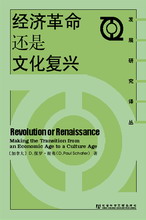Reviews

REVOLUTION OR RENAISSANCE
Making the Transition from an
Economic Age to a Cultural Age
by
D. Paul Schafer
If several hundred years from now human beings (provided they still exist at that time) look back at the present era, they will discern among many well-meaning enthusiasts and fanatics out to change the derailed direction of our species' evolution, a few voices of true maturity. These voices are those of persons who thoroughly consider both sides of any position and provide weight for the one they have chosen only after having explored the sources, the nature, and the probable course toward the future of each. They are the innovators destined to stand out in the history books of the future.
One of these voices is that of D. Paul Schafer -- and perhaps also that of his publisher, because of equal importance with a new message are those who fully understand its importance and transmit it to posterity. Without them, any voice, no matter how essential for the human fate, is destined to drown in the clamour of present opinions.
This author's message is important for the human fate. D. Paul Schafer argues that major transitions of world views during the course of human history have come about in two ways: either through non-violent evolution -- the gradual conviction that the new world view is preferable -- or through revolutions, wars and violence with devastating consequences. His latest work is dedicated to bring about by peaceful means a new transition of our present dominant world view, the economic one, to a larger, more encompassing vista, the cultural era -- and to the reasons why such a transition is urgently needed.
His fairness is outstanding. Although his main argument is against the inflation of special interest groups and their intrusion into the web of inter-human relations where they thoughtlessly destroy the most valuable human assets, he nevertheless recognizes the value of science and economics, whose dominance he tries to reduce. As part of the web of culture, and used to liberate the best in human beings, they are essential. Schafer is keenly aware of one major problem which could not even have been known without science. After listing the environmental crises, the threat of nuclear and biological warfare, the rapidly escalating gap between rich and poor, etc., he continues:
"Standing behind these problems is an even more dangerous and potentially life-threatening problem. With the world's population at six billion and growing rapidly, and with the carrying capacity of the earth severely limited, the entire global eco-system could collapse if ways are not discovered to prevent it. "
The word "Renaissance " in the title describes an example of peaceful, evolutionary change in our world view, with "major advances in the arts and sciences, incredible bursts of creativity and imagination, and new ways of looking at the world. " In contrast the French, Russian, and Chinese revolutions, demonstrate what will happen if the conviction prevails that "transformation in the human condition can only be achieved through bloodshed, brutality, and oppression. " Schafer foresees a repetition, only on a vastly larger scale, of the latter "solution " to our problems, if the present economic world view remains dominant.
With painstaking thoroughness, the author builds a solid fundament for his conclusion. The source and the entire history of the economic world view are described in detail; its advantages and disadvantages are discussed, the latter of which include "consumption of the world's renewable and non-renewable resources at an alarming rate " and "multiplication of consumer demands and expectations that are impossible to fulfill.
His case for the benefits of a cultural age is made with equally conscientious attention to detail. It would give priority to "the whole " rather than to "part of the whole " ... "as well as achieve balanced, harmonious and equitable relationships between the parts and the whole, economics and all other activities in society. "
The manuscript is divided into two parts, Part I, which makes the case for and against economics, and Part II, which traces the sources and development of Culture, as well as its need to become an overarching Worldview which guides our further development into the far future. An extensive and well-written Prologue sets the entire undertaking into context and draws attention to its importance and urgency… It indicates that not only his thoroughness has been maintained, but that his writing received new life and new wings through the importance and urgency of his message.
In spite of his success in the field of education, it is Schafer's wish that his new book may reach beyond that field to touch the general public.
Dr. Erika Erdmann, Founder and Editor of Humankind Advancing

